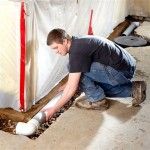What Is Good Humidity Level In Basement
The basement is a crucial part of any home, offering additional space for storage, living, or even a home office. However, maintaining a healthy humidity level in the basement is essential to prevent damage to the structure and belongings, as well as to ensure a comfortable and healthy environment.
Humidity refers to the amount of water vapor present in the air. An ideal humidity level for a basement ranges between 30% and 50%. Maintaining humidity within this range helps prevent moisture problems, such as mold and mildew growth, which can damage building materials, furniture, and other stored items.
Signs of High Humidity
Excessive humidity in the basement can manifest in various ways:
- Condensation on windows, walls, and pipes
- Musty odors
- Mold or mildew growth
- Damp or wet floors
- Rusting metal objects
Causes of High Humidity
Several factors can contribute to high humidity in the basement:
- Poor ventilation
- Water leaks or flooding
- Uninsulated walls or floors
- Basement dehumidifier malfunctions
Consequences of High Humidity
Prolonged exposure to high humidity in the basement can lead to serious consequences:
- Mold and mildew growth, which can cause respiratory problems and damage building materials
- Structural damage to walls, floors, and ceilings
- Damage to furniture, appliances, and other stored items
- Increased risk of pests, such as insects and rodents
Maintaining Proper Humidity Levels
To maintain optimal humidity levels in the basement, several measures can be implemented:
- Ventilation: Ensure adequate ventilation by opening windows and doors, installing fans or vents, or using a dehumidifier.
- Waterproofing: Fix any leaks or sources of water intrusion to prevent moisture buildup.
- Insulation: Insulate basement walls and floors to reduce heat loss and prevent condensation.
- Dehumidification: Use a dehumidifier to remove excess moisture from the air. Consider a model specifically designed for basements.
- Air conditioning: Air conditioning systems can help reduce humidity levels by cooling and dehumidifying the air.
Monitoring Humidity Levels
Regularly monitoring humidity levels in the basement is crucial to ensure they remain within the optimal range. A hygrometer, a device that measures humidity, can be used for this purpose. Place the hygrometer in a central location in the basement and check the readings periodically. If the humidity level is consistently above 50%, it's time to take action to reduce it.

How To Achieve An Ideal Basement Humidity Of 30 50

How To Achieve An Ideal Basement Humidity Of 30 50

How To Achieve An Ideal Basement Humidity Of 30 50

What Is The Ideal Basement Humidity Level Epp Foundation Repair

How To Lower Your Basement S Humidity Level

5 Effective Tips To Reduce Humidity In Your Basement News And Events For Thrasher Foundation Repair

Relative Humidity Chart For Ideal In The House

The Ideal Humidity Level For Your Basement Reliable Waterproofing

Basement Humidity Levels Variations Impacts And Controling

What Should Humidity Be In A Crawl Space Nia
See Also








